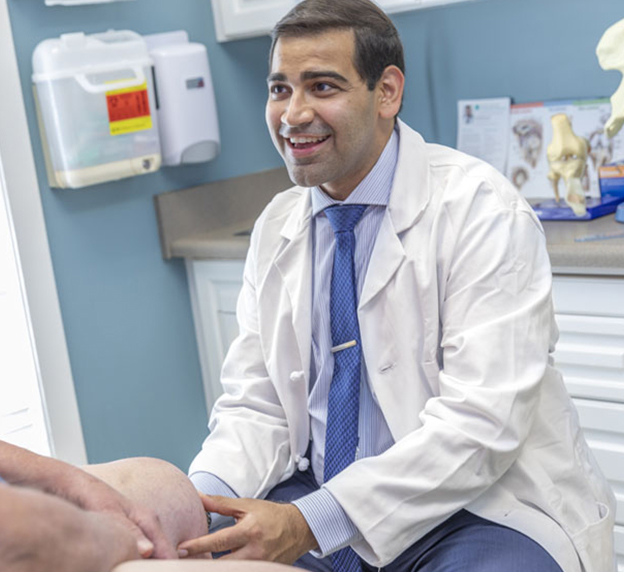How Long Do Knee Replacements Last on Average?
May 28, 2024Categories: Orthopedics, Knee Replacement

Having total knee replacement surgery can feel like a big decision. You not only want to know whether the procedure will address your pain, but you also want to know whether the new joint will last as long as you need it to.
“One frequently asked question patients ask about joint replacement is how long their new joint will last,” says Dr. Vandit Sardana, a board-certified, fellowship-trained orthopedic surgeon at Beaufort Memorial Orthopaedic Specialists. “The good news is that knee replacement implants can last many years and help you enjoy an active lifestyle with much less pain. It is now a realistic hope that the new knees will last the average patient their lifetime.”
Read More: 4 Common Myths About Total Joint Replacement, Debunked
How Long Do Knee Replacements Last?
Historically, hip and knee replacements used to only last around 10 to 15 years. However, with the progress in surgical techniques and implant technology, today's knee replacements can last for 15 to 25 years, and some even last longer. As the stability of knee replacements continues to improve, the chances of needing a second knee replacement later in life are reduced.
Newer surgical methods and tools, such as the Mako SmartRoboticsTM and VELYSTM robotic-assisted system in use at Beaufort Memorial, provide more precise placement, alignment and rotation of the implant and a more balanced joint.
The types of materials used to fabricate the implant or prosthesis have also made a significant difference in longevity. Modern implants are made of lightweight, long-lasting materials, including:
- Ceramic or ceramic-metal mixtures
- Medical-grade polyethylene
- Titanium-chromium or cobalt-chromium alloys
“For many patients, knee replacement surgery is a once-in-a-lifetime event,” Dr. Sardana says. “The implants and technologies we use factor in your anatomy and your joint’s range of motion, which can lead to more successful joint replacements.”
When Knee Replacements Need Replacing
For many people considering knee replacement, questions about longevity stem from concerns that they may need revision surgery later in life.
In many cases, revision surgeries are performed because of:
- Joint instability that can occur if your knee ligaments experience damage
- Loosening of the new joint
- Scar tissue that developed around the knee joint before a total knee replacement and causes stiffness, even with a new joint
- Wear and tear on materials, which can be related to high-impact activities and excess weight
“We can’t guarantee that a revision surgery will never be necessary,” Dr. Sardana says. “However, the advanced technologies we use allow us to plan procedures more accurately and, hopefully, reduce the chances that your knee replacement will fail. We also work closely with patients before and after the procedure to ensure they follow pre- and post-op instructions, which may allow us to address some of these issues before they occur.”
Read More: What to Expect After Knee Replacement Surgery
Helping Your Knee Replacements Last
It's important to properly care for your new knee joint to ensure that it stays healthy for as long as possible and avoid the need for additional surgeries in the future. Pay close attention to your new knee during the first few weeks after surgery and be cautious about any movements that could compromise its safety.
Physical therapy is essential to the healing process. Your physical therapist will work with you to strengthen the muscles surrounding your joint and give you advice about which activities to avoid. Low-impact exercises, such as walking, cycling and swimming, are great options for staying active. However, you may need to avoid high-impact exercises, such as running and skiing, to prevent wear and tear on the new joint.
In the days immediately after surgery, follow these tips to ease your recovery:
- Bathing — Ask a loved one to help you clean hard-to-reach areas of your body. Use a shower chair if you feel uncomfortable standing. Avoid sitting inside a regular bathtub, as you will have a hard time getting back on your feet.
- Climbing — When using stairs, take your time and use the handrail. Step first with your non-treated leg when going up and with your treated leg on the way down. If possible, avoid tall, long staircases.
- Dressing — Whether you sit on a chair or on the edge of your bed, being seated can prevent a fall while getting dressed. The National Institutes of Health recommends you put socks and shoes on your treated leg first and start with your treated leg when putting on pants. Then, do the opposite when undressing, removing clothing from your treated leg last.
- Resting — Keep your new knee straight and lie on your back when resting. Elevate your foot as well as your knee to keep your leg straight.
- Sitting — Sitting too much in one position may lead to stiffness or pain. If you need to sit for long periods, change your position every 45 to 60 minutes. If you can, however, get up and move around before sitting back down. Sitting in a firm chair with armrests may make it easier for you to get up out of your chair.
- Using assistive devices — Crutches or a walker help you maintain your balance and reduce the amount of weight on your new knee. Use these assistive devices as long as your surgeon recommends.
Read More: From OR to RV: Enjoying Life After Knee Replacement
Ongoing Care for Your New Joint
To maximize how long your knee replacement lasts, you should:
- Complete your entire physical therapy plan.
- Attend all follow-up appointments with your care team.
- Listen to and follow your care team’s advice.
- Stay active to keep the muscles around your new knee strong and maintain good balance.
- Understand what to expect after knee replacement and when to seek medical attention for pain or other issues.
“Many patients tell me they wish they’d had their knee replacement sooner,” Dr. Sardana says. “If you’re concerned about having the procedure because you think it may only lead to future surgeries, we’re happy to talk through those concerns with you. We want you to regain your quality of life and will do our best to make sure you gain the most benefits possible from a new knee.”
Considering knee replacement surgery? Request an appointment with an orthopedic surgeon at Beaufort Memorial.


